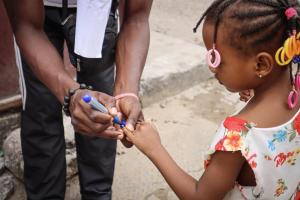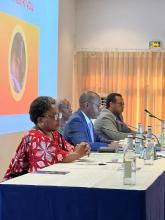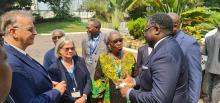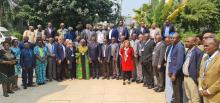Africa’s polio certification commission calls for urgent action to bolster vaccination
Kinshasa – With 117 confirmed cases of circulating variant polioviruses and 107 detections in sampled wastewater so far in the African Region in 2023, the Africa Regional Certification Commission (ARCC) has urged countries and health partners to urgently address gaps in polio immunity to avert outbreaks.
The ARCC, which held it 31st meeting in the Democratic Republic of the Congo from 3 to 7 July, also called for an accelerate implementation of supplementary immunization activities, while considering challenges in accessibility to services including gender-related issues. The commission stressed the importance of gender equality in the polio fight, noting the crucial role women play in management, supervision, decision-making, message development and monitoring for polio control. The ARCC also urged countries to conduct robust preparations and ensure the vaccination campaigns are of the highest quality.
“The guidance will allow health authorities and partners to provide focused support to strengthen microplanning and social mobilization in areas with poor campaign performance, among other key areas of action“ said Professor Rose Leke, Chair of the Africa Regional Certification Commission.
The meeting gathered representatives of national and provincial health authorities from Chad, the Democratic Republic of the Congo, Ethiopia, Madagascar, Mali and Mozambique who committed to strengthen disease surveillance and consolidate the Expanded Programme on Immunization in hard-to-reach areas, with the support of the World Health Organization (WHO) and health partners.
Attendees took note of the increasing risk of poliovirus type 1 beyond Madagascar and the DRC, especially with the deterioration of routine immunization during the COVID-19 pandemic. Concerns were also raised regarding the persistently security-compromised areas, especially in Nigeria, that are impeding the elimination of circulating variant poliovirus type 2 (cVDPV2).
The commission, therefore, encouraged health authorities to also expand the use of Geospatial Information Systems to improve quality of surveillance and outbreak response.
“We are looking forward to implementing the additional ARCC recommendations to guide how we can deliver on the promise of polio-free Democratic Republic of the Congo and Africa,” said Dr Serge Emmanuel Holenn, Deputy Minister of Health of the Democratic Republic of the Congo, who applauded the commission, WHO and the Global Polio Eradication Initiative partners for the continued financial and technical support in the fight against polio in the country.
In addition to the DRC, Chad, Ethiopia, Madagascar, Mali and Mozambique also presented progress in polio control and lessons learned. Although certification of polio eradication occurs at the regional level, all countries with polio-free status are required to provide the certification commission with annual updates. These containment reports and outbreak preparedness plans allow for continuous monitoring.
The ARCC commended health authorities for their leadership in responding to ongoing polio outbreaks, as “this reflects the deep commitment and continued collective efforts by African countries and partner organizations to the fight against polio,” said Professor Leke.
The ARCC is an independent body established in 1998 to oversee the certification status of the African region as free from indigenous wild poliovirus. It continues to evaluate reliability of data in documentation submitted by National Certification Committees to ensure that countries are adhering to the criteria set for the global certification of wild polio virus. The ARCC meets twice a year to review progress made in the annual certification updates of selected countries on polio eradication activities of all the 47 member’s state of the WHO African region.
Communications Officer
Polio Eradication Programme
WHO Regional Office for Africa
Email: mongem [at] who.int (mongem[at]who[dot]int)
Tel: + 34 636 04 76 79
Communications Officer
WHO DRC
Tel : +243 81 715 1697
Office : +47 241 39 027
Email: kabambie [at] who.int (kabambie[at]who[dot]int)



